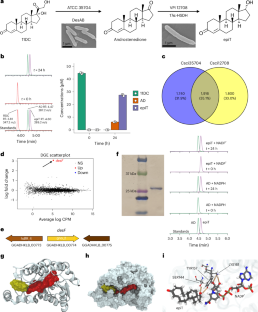2025-05-28 イリノイ大学アーバナ・シャンペーン校
<関連情報>
- https://cancer.illinois.edu/study-links-urinary-tract-bacteria-to-prostate-cancer/
- https://www.nature.com/articles/s41564-025-01979-9
常在細菌によるアンドロゲン産生の代謝経路の拡大 An expanded metabolic pathway for androgen production by commensal bacteria
Taojun Wang,Saeed Ahmad,Angélica Cruz-Lebrón,Sarah E. Ernst,Kelly Yovani Olivos Caicedo,Yoon Jeong,Briawna Binion,Pauline Mbuvi,Debapriya Dutta,Francelys V. Fernandez-Materan,Adam M. Breister,Elizabeth Tang,Jae Won Lee,Jason D. Kang,Spencer C. Harris,Shigeo Ikegawa,H. Rex Gaskins,John W. Erdman Jr,Glen Yang,Isaac Cann,Steven L. Daniel,Phillip B. Hylemon,Karthik Anantharaman,Rafael C. Bernardi,… Jason M. Ridlon
Nature Microbiology Published:21 April 2025
DOI:https://doi.org/10.1038/s41564-025-01979-9

Abstract
Commensal bacteria have been implicated in the modulation of steroid hormones, including circulating androgen levels in the host. However, the microbial genetic pathways involved in androgen production have not been fully characterized. Here we identify a microbial gene encoding an enzyme that catalyses the conversion of androstenedione to epitestosterone in the gut microbiome member Clostridium scindens and named this gene desF. We demonstrate that epitestosterone impacts androgen receptor-dependent prostate cancer cell proliferation in vitro. We also demonstrate that stool desF levels are elevated in patients with prostate cancer who are unresponsive to abiraterone/prednisone therapy. Bacterial isolates from urine or prostatectomy tissue produced androgens, and 17β-hydroxysteroid dehydrogenase activity encoded by the desG gene was detected in strains of the urinary tract bacterium Propionimicrobium lymphophilum. Furthermore, we demonstrate that urinary androgen-producing bacterial strains can promote prostate cancer cell growth through metabolism of cortisol and prednisone. Abiraterone, which targets host desmolase (CYP17A1), a rate-limiting enzyme in adrenal steroidogenesis, does not inhibit bacterial desmolase (DesAB), whereas the conversion of prednisone to androgens by DesAB, DesF and DesG drives androgen-receptor-dependent prostate cancer cell line proliferation in vitro. Our results are a significant advance in steroid microbiology and highlight a potentially important role for gut and urinary tract bacteria in host endocrine function and drug metabolism.

